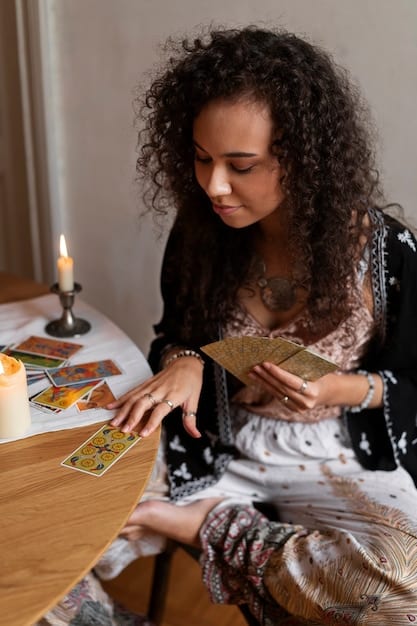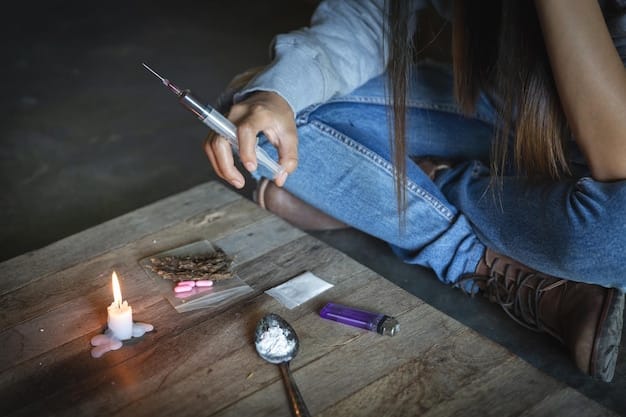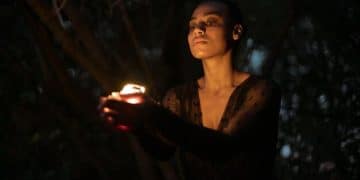Ethical Witchcraft: Practicing with Responsibility and Respect

Ethical considerations in witchcraft involve practicing magic responsibly, respecting free will, and avoiding harm to oneself and others, ensuring actions align with personal values and contribute positively to the world.
The practice of witchcraft, often shrouded in mystery and misunderstanding, is fundamentally about wielding personal power and connecting with the energies of the universe. However, with great power comes great responsibility. Understanding and adhering to ethical considerations in witchcraft: practicing with responsibility and respect is vital for ensuring that your craft brings positive outcomes and aligns with your values.
Understanding Ethical Frameworks in Witchcraft
Exploring ethical frameworks in witchcraft is essential for responsible practice. These frameworks serve as guiding principles, ensuring that magical actions align with personal values and contribute positively to the world. By understanding these frameworks, practitioners can avoid unintended harm and create beneficial outcomes.
The Wiccan Rede and Its Interpretations
The Wiccan Rede, “An it harm none, do what ye will,” is a central ethical tenet. It emphasizes the importance of avoiding harm in all actions. This principle guides many Wiccans and witches to consider the potential consequences of their spells and rituals, ensuring that their magic does not negatively impact others.
- Avoiding Direct Harm: Refraining from casting spells intended to cause physical or emotional harm to others.
- Considering Indirect Harm: Evaluating potential unintended consequences and ensuring actions do not indirectly cause suffering.
- Seeking Win-Win Solutions: Aiming for magical outcomes that benefit all parties involved, rather than creating imbalance.
Beyond the Rede: Personal Codes of Conduct
While the Wiccan Rede provides a basic framework, many witches develop personal codes of conduct to guide their practice. These codes often reflect individual values and beliefs, providing a more detailed and nuanced ethical compass. Creating a personal code involves introspection and a deep understanding of one’s own moral principles.

Respect for Free Will and Consent
Respect for free will is a cornerstone of ethical witchcraft. Practitioners must ensure that their magic does not infringe upon the autonomy and choices of others. Consent is also crucial, as any magical action performed without explicit agreement can be considered unethical. Respecting these boundaries honors the inherent dignity of all individuals involved.
The Ethics of Spell Casting on Others
Casting spells on others without their consent is a significant ethical concern. Such actions can be manipulative and disrespectful, violating the individual’s right to self-determination. Even spells intended to help can have unintended consequences, making it essential to secure permission before intervening magically.
Consent ensures that the energies involved are aligned and that the individual is open to receiving the intended benefits. Performing magic on someone without their knowledge can create resistance and lead to unforeseen repercussions.
Divination and Privacy
Divination involves seeking insights into the future or uncovering hidden knowledge. When performing divination for others, it’s crucial to respect their privacy. Avoid delving into personal matters without permission, and always prioritize the individual’s right to control their own information. Ethical divination focuses on providing guidance without infringing upon personal boundaries.
- Seeking Permission: Always ask for explicit consent before performing divination on behalf of someone else.
- Maintaining Confidentiality: Keep any information gained during divination private and confidential.
- Focusing on Empowerment: Use divination to provide guidance and support, rather than to control or manipulate.
In summary, understanding ethical frameworks in witchcraft involves respecting free will, obtaining consent, and considering the potential impacts of magical actions. By integrating these principles, practitioners can ensure their craft aligns with personal values and promotes positive outcomes.
Working with Spirits: Boundaries and Respect
Interacting with spirits is a common practice in many witchcraft traditions. Establishing clear boundaries and treating spirits with respect is essential for maintaining ethical and harmonious relationships. Spirits, like humans, deserve to be treated with dignity and should not be manipulated or exploited.
Safe Practices for Spirit Communication
Communicating with spirits requires caution and awareness. It’s important to protect oneself from negative energies and to ensure that the spirits being contacted are benevolent. Establishing clear communication protocols and setting boundaries can help maintain a safe and respectful environment.
Before initiating contact, research different types of spirits and their potential influences. This knowledge can help you discern which spirits are safe to interact with and how to protect yourself during communication.
Creating a protected space by using crystals, sigils, or prayers can help ward off unwanted energies. It’s also beneficial to have a clear exit strategy in case the communication becomes uncomfortable or unsafe.
Avoiding Manipulation and Exploitation
Treating spirits as equals and avoiding manipulation is paramount. Attempting to control or exploit spirits can lead to negative consequences, both for the practitioner and for the spirit itself. Respectful interactions are built on mutual understanding and reciprocal exchange.

Environmental Consciousness in Magic
Environmental consciousness is increasingly important in witchcraft, reflecting a deep connection to the natural world. Ethical witches strive to minimize their environmental impact and to incorporate sustainable practices into their magic. This involves using eco-friendly materials, respecting natural cycles, and advocating for environmental protection.
Sourcing Materials Responsibly
The materials used in witchcraft, such as herbs, crystals, and candles, should be sourced responsibly. Avoid using endangered species or materials obtained through unethical means. Support local and sustainable suppliers who prioritize environmental stewardship.
Consider growing your own herbs and plants for magical use. This reduces the need for commercial harvesting and allows you to connect more deeply with the energies of nature.
- Supporting Sustainable Suppliers: Choose suppliers who use environmentally friendly harvesting and production methods.
- Growing Your Own Herbs: Cultivate your own magical plants to reduce your environmental footprint.
- Recycling and Reusing: Repurpose materials whenever possible to minimize waste.
Rituals and Earth-Friendly Practices
Designing rituals that minimize environmental impact is an essential aspect of ethical witchcraft. This includes using biodegradable materials, avoiding open fires in dry conditions, and disposing of waste responsibly. Align your practices with the rhythms of nature to enhance their effectiveness and promote environmental harmony.
Consider incorporating elements of nature into your rituals, such as using rainwater, soil, or fallen leaves. These elements can enhance the connection to the earth and promote environmental awareness.
Navigating Cultural Appropriation in Witchcraft
Cultural appropriation is a significant concern in contemporary witchcraft. Ethical practitioners strive to respect and honor the traditions of other cultures, rather than appropriating them without understanding or permission. This involves educating oneself about different cultural practices and seeking guidance from members of those communities.
Understanding the Roots of Traditions
Before incorporating elements from another culture into your witchcraft practice, it’s crucial to understand their historical and cultural context. Research the origins of the tradition, its significance within the culture, and any potential restrictions or protocols. Ignorance is not an excuse for cultural appropriation.
Engage with members of the culture to learn firsthand about their traditions and beliefs. This can provide valuable insights and help you avoid unintentional harm or disrespect.
- Researching Cultural Origins: Learn about the history and significance of traditions before incorporating them into your practice.
- Seeking Guidance: Consult with members of the culture to ensure respectful and appropriate use of their traditions.
- Honoring Cultural Boundaries: Respect any restrictions or protocols associated with specific rituals or practices.
Respectful Integration vs. Appropriation
Respectful integration involves learning about and honoring the traditions of other cultures while avoiding the superficial or exploitative use of their practices. Appropriation, on the other hand, involves taking elements from another culture without understanding or respecting their significance. The key is to approach other cultures with humility and a genuine desire to learn.
Avoid using sacred symbols or practices out of context or for personal gain. Instead, focus on developing a deeper understanding of the culture and its values.
The Importance of Self-Care and Boundaries
Self-care and boundaries are essential components of ethical witchcraft. Practicing magic can be emotionally and energetically demanding, making it crucial to prioritize one’s own well-being. Setting boundaries helps protect against burnout and ensures that you maintain a healthy balance in your life.
Recognizing and Preventing Burnout
Burnout can occur when the demands of magical practice exceed your emotional and energetic resources. Recognizing the signs of burnout, such as fatigue, irritability, and loss of motivation, is the first step in preventing it. Taking breaks, practicing self-care, and setting realistic goals can help you avoid burnout and maintain a sustainable practice.
Regularly assess your energy levels and emotional state. If you feel overwhelmed, step back from your practice and focus on restoring your well-being.
Establishing Healthy Boundaries
Setting boundaries is essential for protecting your time, energy, and emotional well-being. This includes setting limits on the number of spells you cast, the amount of time you spend on magical practice, and the types of energies you work with. Healthy boundaries ensure that your witchcraft practice enhances your life, rather than detracting from it.
Communicate your boundaries clearly to others and be prepared to enforce them. This may involve saying no to requests for magical assistance or limiting your interactions with certain individuals or energies.
By understanding the ethical frameworks, respecting spirits, being environmentally conscious, avoiding cultural appropriation, and practicing self-care, witches can navigate their craft responsibly and respectfully.
| Key Point | Brief Description |
|---|---|
| ✨ The Wiccan Rede | “An it harm none, do what ye will,” emphasizing avoiding harm to others. |
| 🤝 Respect & Consent | Always respect free will and obtain consent before casting spells on others. |
| 🌿 Environmental Consciousness | Use sustainable materials and eco-friendly practices in your magical work. |
| 🛡️ Self-Care & Boundaries | Prioritize self-care and set boundaries to avoid burnout in your practice. |
Frequently Asked Questions
▼
The most important ethical consideration is to avoid causing harm to yourself or others. This is often encapsulated in the Wiccan Rede: “An it harm none, do what ye will.”
▼
No, casting a love spell or any spell that interferes with someone’s free will is generally considered unethical. Consent is a fundamental aspect of ethical witchcraft.
▼
Use sustainable and ethically sourced materials. Recycle, grow your own herbs, and perform rituals in ways that minimize environmental impact. Respect nature’s cycles.
▼
Take responsibility for your actions and attempt to rectify the situation. Cast a spell to undo the harm, if possible, and learn from the experience to avoid similar mistakes in the future.
▼
Educate yourself about the origins and significance of any traditions you wish to incorporate. Seek guidance from members of the culture and respect their boundaries. Avoid using sacred symbols out of context.
Conclusion
In conclusion, ethical considerations in witchcraft: practicing with responsibility and respect are fundamental to creating a positive and meaningful magical practice. By adhering to principles of non-harm, consent, environmental consciousness, and cultural sensitivity, witches can ensure that their craft aligns with their values and contributes to a more harmonious world.





